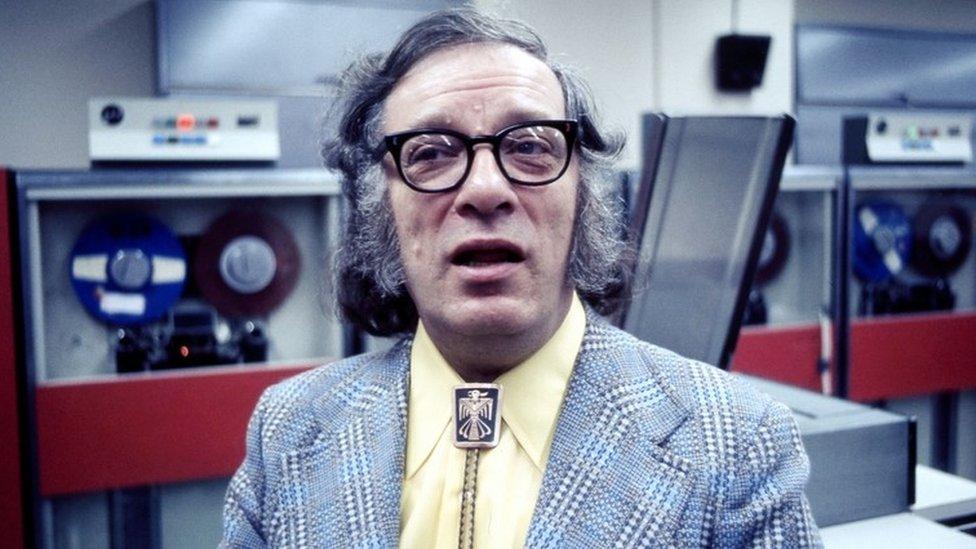Asimov's 2019 predictions - fiction or fact?
- Published

Isaac Asimov wrote three basic laws of robotics which many experts still refer to
Back in 1983, science fiction writer how the world would look in 2019.
His thoughts, written originally for the Toronto Star newspaper, can now be compared against reality.
Many have proved surprisingly accurate.
He foresaw the rise of computers, saying the complexity of society would make them "impossible to do without", disrupting work and penetrating the home.
"To think that computers would take over the world was remarkably insightful at that time," thinks Calum Chase, who writes both fiction and non-fiction books on the subject of artificial intelligence.
"Most bosses did not use computers in the 80s. It was their secretaries who had them and they would print out emails for the bosses to read. The internet was around but not many people knew about it."
Asimov also predicted that robotics would revolutionise the way we work, with automation stealing clerical and factory jobs, forcing people to reconsider new careers or even living "a life rich in leisure".
In the world of education, he predicted that children would no longer need teachers, other than to "inspire curiosity", learning everything they needed to know from computers at home.
That has not come true, with many schools relying on teaching methods that have been used for many years. It will take a few more decades for Asimov's vision to become reality, thinks Mr Chase.
"In 30 years time machines will know what each student knows and what he or she needs to learn next. There is no way that humans can equal that educational power," he said.
Moonshot?
Where Asimov was less accurate were his predictions about humankind's relationship with space. He foresaw that by 2019 humans would have mining factories and a solar power station on the Moon, with strides towards building the first space settlement well under way.
The International Space Station is indeed a permanent structure circling the Earth, but the Moon has not been colonised.
The reasons for this are political rather than technological, thinks Mr Chase.
"The space race fell off a cliff when the Soviet Union collapsed. That took the pressure off America which had previously felt they had to beat the Soviets for political and prestige reasons. It became impossible to get the budgets through Congress."
In 2017, the White House announced plans to go back to the Moon and build permanent structures there for exploration and experimentation.
There have not been as many footprints on the Moon as Asimov predicted
Space entrepreneur Elon Musk hopes to offer the first private passenger flight around the Moon in 2023.
Asimov correctly predicted that over-population and pollution would increase, although he hoped - rather optimistically - that "by 2019 advances in technology will place in our hands the tools that will help accelerate the process whereby the deterioration of the environment will be reversed".
Next 30 years?
"His predictions are absolutely fascinating," said Mr Chase.
"The things he got wrong are interesting but there is a lot that he got right. He was a genius."
And it proves that the art of future-gazing - notoriously difficult at the best of times - can be useful.
"His article shows some of the broad outlines of the future, even if the detail is wrong."
As to what the next 30 years may hold, Mr Chase believes it will be a time of dramatic change.
"I am not sure that anyone has grasped just how big the changes that are coming in the next 30 years are," he told the ┤¾¤¾┤½├¢.
One thing that Asimov did not really predict was the rise of artificial intelligence, which Mr Chase believes will be a key technology for the next few decades.
"In the next 30 years, the global economy will completely reshape," said Mr Chase.
"There will be no professional drivers, no call centres, retail will have changed and we will have to find new things to do. If we can find a way to make it economically possible, we can lead the life of leisure that Asimov talked about."